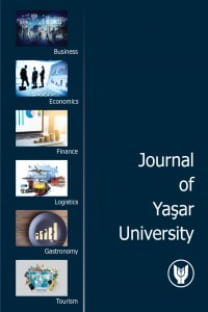CULTURAL CHANGE MANAGEMENT AND QUALITY IN THE TOURISM INDUSTRY
CULTURAL CHANGE MANAGEMENT AND QUALITY IN THE TOURISM INDUSTRY
Change, Organizational Culture Quality, Lodging,
___
- Abraham, M., Crawford J., Fisher T. (1999), “Key Factors Predicting Effectiveness of Cultural Change and Improved Productivity in Implementing Total Quality Management”, The International Journal of Quality and Reliability Management, Vol. 16, No. 2
- Adebanjo, D. and Kehoe, D. (1998), “An Evaluation of Quality Culture Problems in UK Companies”, International Journal of Quality Science, Vol. 3, No.3
- Ahls, B. (2001), “Organizational Behavior: A Model for Cultural Change”, Industrial Management, Vol.43, Iss.4
- Cameron, E., Green, M. (2004), Making Sense of Change Management: a Complete Guide to the Models, Tools and Techniques of Organizational Change, London, GBR: Kogan Page Limited
- Cartwright J., Andrews T., Webley P. (1999), “A Methodology for Cultural Measurement and Change: A Case Study”, Total Quality Management, Vol. 10, No.1
- Clarke, M., Meldrum, C. (1999), “Creating Change From Below: Early Lessons For Agents Of Change”, The Leadership & Organization Development Journal, Vol. 20 No.2
- Claver, E., Gasco, J., Llopis, J., Gonzalez, R. (2001), “The Strategic Process of A Cultural Change to Implement Total Quality Management: A Case Study”, Total Quality Management, Vol. 12, No.4
- Dupuy, F. (2001), Chemistry of Change: Problems, Phases and Strategy, Gordonsville, VA, USA: Palgrave Macmillian
- Higgins, J.M., Mcallaster C. (2004), “If You Want Strategic Change, Don't Forget to Change Your Cultural Artifacts”, Journal of Change Management, Vol. 4, No.1
- Howard, H. (2000), Managing Quality, Broadstairs, Kent, UK: Scitech Educational
- Juran J.M. (1998), Quality in the Travel and Hospitality Industries, Blacklick, OH, USA:McGraw-Hill Companies
- Kennerfalk, L. and Klefsjö, B. (1995), “A Change Process for Adapting Organizations to A Total Quality Management Strategy”, Total Quality Management, Vol. 6, No.2
- Ruigrok, W., Achtenhagen, L. (1999), “Organizational Culture and the Transformation towards New Forms of Organizing”, European Journal of Work and Organizational Psychology, Vo.8, No.4
- Saraph, J.V. and Sebastian, R.J. (1993), “Developing A Quality Culture”, Quality Progress, September
- Sauser W.I. and Sauser L.D. (2002), Changing the Way We Manage Change, Westport, CT, USA: Greenwood Publishing Group, Incorporated
- Schein, E., Organizational Culture & Leadership, http://www.tnellen.com/ted/tc/schein.html (accessed: 27.04.2005)
- Sims, R., Sims, S. (2002), Changing the Way We Manage Change, Westport, CT, USA: Greenwood Publishing Group, Incorporated
- Small A.W., Downey A. E. (2001), “Managing Change: Some Important Aspects”, IEEE
- Smith, C. (2000), “Organizational Culture in Practice”, Human Resource Development International, Vol.3, No. 2
- Smith C.S., Barnes R., Townsend M.C. (2002), “Cultural Surveys: Monitoring and Enhancing the Impact of Change Programs”, Total Quality Management, Vol.13, No.6
- Tsang J.H.Y., Antony J. (2001), “Total Quality Management in UK Service Organizations: Some Key Findings from A Survey”, Managing Service Quality, Vol.11, No.2
- Williams, C. (2003), Service Quality in Leisure and Tourism, Cambridge, MA, USA: CABI Publishing
- Wilkinson, A. and Witcher, B. (1993), “Holistic TQM Must Take Account of Political Processes”, Total Quality Management, Vol. 4, No.1
- ISSN: 1305-970X
- Başlangıç: 2006
- Yayıncı: Yaşar Üniversitesi
ALTIN FİYATLARINDAKİ İSTİKRARSIZLIĞIN ALTIN TİCARETİ ÜZERİNDEKİ ETKİSİ: TÜRKİYE ÖRNEĞİ
Yrd. Doç. Dr. Levent GÖKDEMİR, Arş. Gör. Suzan ERGÜN
Assoc. Prof. Cengiz DEMİR Assist. Prof. GÜZEL
ULTRASONİK VE DİĞER SİVRİSİNEK KOVUCULAR
THE DEVELOPMENT OF REGIONAL ECONOMETRIC MODELS
Prof. Dr. Yüksel İŞYAR Hocamız’ın Anısına, Yuksel ISYAR, Siegfried BAUER
CULTURAL CHANGE MANAGEMENT AND QUALITY IN THE TOURISM INDUSTRY
